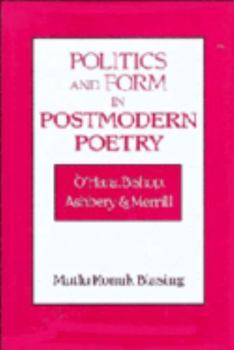Politics and Form in Postmodern Poetry
(Part of the Cambridge Studies in American Literature and Culture Series)
Select Format
Select Condition 
Book Overview
Approaching post-World War II poetry from a postmodern critical perspective, this study challenges the prevailing assumption that experimental forms signify political opposition while traditional forms are politically conservative. It defines postmodern poetry as a break with modernism's valorization of technique and its implicit collusion with technological progress. It shows how four major postwar poets Frank O'Hara, Elizabeth Bishop, John Ashbery, and James Merrill cannot be read as politically conservative because formally traditional or as culturally oppositional because formally experimental. All these poets acknowledge that no one form is more natural than another, and no given form grants them a superior position for judging cultural and political arrangements. Their work plays an important cultural role precisely by revealing how meanings and values do not inhere in forms but are always and irreducibly rhetorical.
Format:Hardcover
Language:English
ISBN:0521496071
ISBN13:9780521496070
Release Date:November 1995
Publisher:Cambridge University Press
Length:236 Pages
Weight:1.10 lbs.
Dimensions:0.8" x 6.3" x 9.3"
Customer Reviews
0 rating





